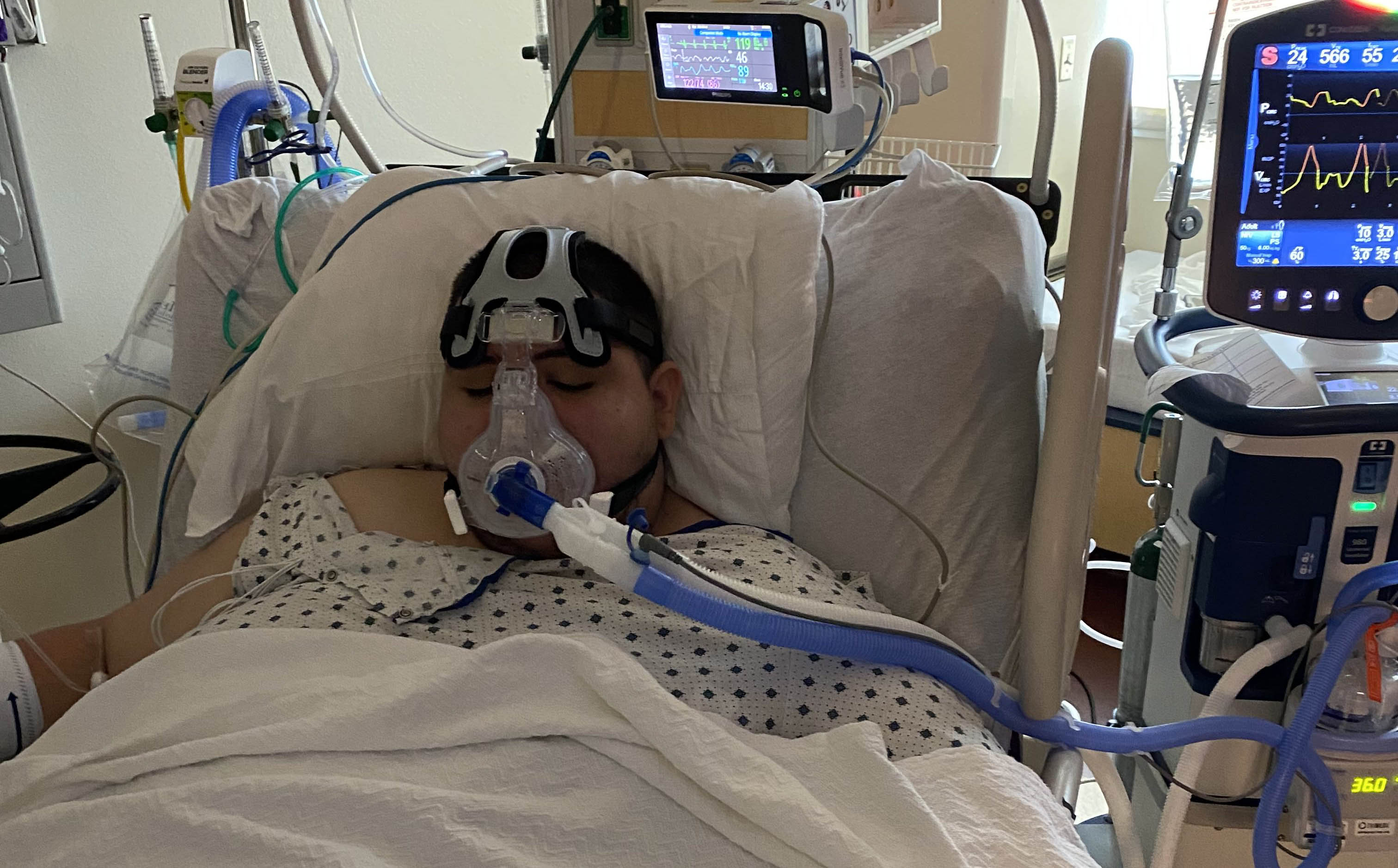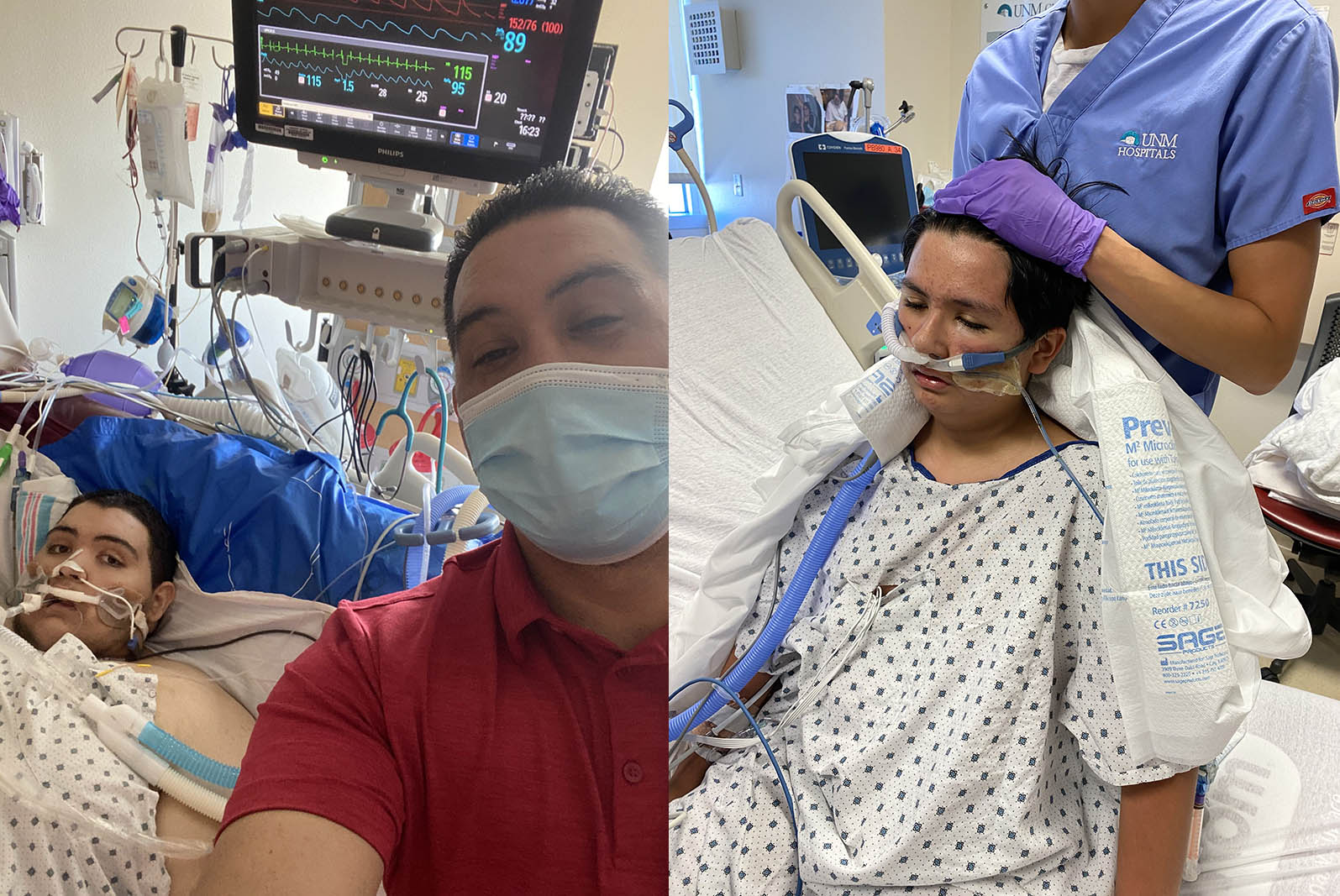Preparing for Disaster: UNM Hospital Participates in Region-Wide Emergency Training

Fighting for Life
Weeks-Long Ordeal After Teens Fall Critically Ill from COVID
For the past several weeks, Jason Baca has called The University of New Mexico Hospital home.
Two of his teenage sons, his wife and his mother-in-law were diagnosed with COVID-19 in mid-August. His wife, Renee Baca, was released from the hospital after a two-week stay. His mother-in-law, Sandra Moya, was admitted and passed away.
The Bacas’ two sons, Jason Lee Baca, 17, and Ayden Baca, 13, are still in the pediatric intensive care unit.
There is a misconception that kids can’t get seriously ill with COVID, said Walter Dehority, MD, MSc, associate professor in the UNM Department of Pediatrics.
“Both of the boys have been critically ill, which really dispels the myth that kids don't get sick with COVID,” Dehority said. “Both of them have been in the intensive care unit for about a month. And both of them have required extreme life support measures, such as a breathing machine and medications to keep their blood pressure up, as well as multiple courses of antibiotics.”
The brothers have also had heart problems and persistent fevers, he said. No one in the family had received a COVID vaccination.
“I just want to emphasize that we don't have a really good treatment for this, so if families want to know how to prevent this from happening, get the vaccine,” Dehority said. “That’s the best thing we have to deal with this disease. (Kids) 12 and above can get the vaccine, and we're hoping soon, based on the Pfizer announcement this week, that 6- to 12-year-olds will be able to receive a vaccine as well, hopefully by the end of the year.”
It has been exhausting and overwhelming for the family of nine from Los Lunas, but the Bacas say their prayers are what keep them all afloat.
“It’s been a roller coaster ride,” Renee said.

Jason Lee has been hospitalized for about five weeks – and intubated for more than 28 days, while Ayden has been in the pediatric ICU for four weeks, the family says.
It all began in mid-August when a couple of family members thought they had a cold – runny noses, coughing, headache. Then others began to fall ill. On August 15, they were tested for COVID-19. They suspect that one of their younger children, who had only minor cold symptoms and quickly recovered, brought the virus home from school.
Jason Lee was the first in the family to be hospitalized, and he’s still on a ventilator.
“He had a headache and trouble breathing,” Jason Baca said during a recent interview at UNMH. Renee added that of all the family members who were sick, he didn’t complain much. “I think he was being tough,” she said.
The Bacas initially sought medical care after Jason Lee had a night of nonstop coughing. He was initially admitted to Presbyterian Hospital and was transferred to UNMH, they said. “They’re really good here,” Jason said. “They’re caring people trying to help us.”
Jason Lee’s symptoms appeared to be mild until two days before he was admitted to the hospital. “It really turned the corner within about 48 hours or so before he came in,” Dehority said. “It can sneak up on you."

The far and away better thing to do is just not get COVID. That's where the vaccine comes in, because we just don't have really effective therapies, but we do have an effective vaccine.
Doctors have a limited set of tools to treat severe COVID symptoms, he said. “We do have some medicines, like remdesivir, but they're not great, honestly. The far and away better thing to do is just not get COVID. That's where the vaccine comes in, because we just don't have really effective therapies, but we do have an effective vaccine.”
At one point while Renee was hospitalized in UNMH’s intensive care unit, she was taken to say a final good-bye to Jason Lee. Doctors said he had “zero percent chance of survival,” Jason said. (By then, their younger son, Ayden, had also been admitted.)
Doctors were assessing whether Jason Lee needed extracorporeal membrane oxygenation (ECMO).
“It’s basically a heart-lung bypass, which is really the most extreme form of life support,” Dehority says. “That's how sick he was.” ECMO removes carbon dioxide and sends oxygen-filled blood back in the body, giving the heart and lungs a chance to heal.
The Bacas said they weren’t ready to say good-bye.
“They're like, ‘You can call five family members to come see him and pretty much say goodbye,’ and I said, ‘I'm not going to say that. I'm going to go in there and I'm going to pray,’” Renee said. “I prayed and prayed. And then I just kept praying, and I know God's the one who's healed him.”
That night, Renee’s mother, who was also at UNMH, passed away. “Then Jason’s oxygen (level) went up,” she said. “I believe my mom was there with him.”
It has been two and a half weeks since Renee, who is still using oxygen, was released from the hospital. In that time, she attended the funeral for her mother, who was 58 years old.
Jason Lee and Ayden are still in the pediatric ICU, but they are getting better, Dehority said.
Jason, a junior at Century High School, is still on the ventilator, and he may need a tracheostomy, a procedure to create an opening in the neck so that a tube can be inserted to help a patient breathe. His fevers and lab work are improving, Dehority said.
“He's making some improvements, but he's lagging behind,” he added.
Ayden is off the breathing machine but still on high oxygen support. “That’s a huge improvement for him,” Dehority said.
The Bacas said that Ayden, a seventh-grader at Los Lunas Middle School, seems to be doing lots better and recently was able to have pizza as his first solid food.
Renee, who works at Walmart in Belen, isn’t sure why she and her sons got so sick with COVID pneumonia when other family members seemed to “bounce back.”
The Bacas also said that having the kids stay home from school for a year prevented them from being as physically active as they were when they attended classes in person.
Jason, who works at a machine shop, said he’s going to get the vaccine. Sitting the in pediatric ICU, he’s had lots of time to talk to medical staff and think about the “what if’s,” he said.
“What I keep thinking about is if we had been vaccinated . . . maybe (the family) wouldn't have got so sick,” Jason said. “Maybe it could have prevented that spread a little bit.”
Renee, on the other hand, is still “undecided” about whether to get the vaccine. The Bacas aren’t sure whether they’ll have their younger children vaccinated when the vaccine is available. They’re going to allow the older kids to decide for themselves, they said.
Dehority emphasizes that everyone should get vaccinated.
“First of all, the vaccines are safe,” he says. “But even if you are fixated inappropriately on some rare side effect of the vaccine, it's not this bad. It’s get the vaccine or risk that your child could end up intubated for a month and on heart-lung bypass. That's the alternative there.”
Meanwhile, as the Bacas spend their time at the pediatric ICU, they continue to pray. They say the prayers people have sent them through prayer chains are what’s keeping them going.
The family has set up a GoFundMe page under the name "Family in Need" for anyone wanting to make a donation.